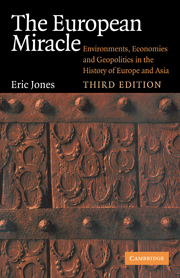Book contents
- Frontmatter
- Contents
- Preface to the third edition
- Preface and acknowledgements
- Introduction to the second edition
- Map
- EURASIA
- EUROPE
- 3 Technological drift
- 4 The Discoveries and ghost acreage
- 5 The market economy
- 6 The states system
- 7 Nation-states
- THE WORLD
- ASIA
- EURASIA
- Afterword to the third edition
- Annotated bibliographical guide to Eurasian economic history in the very long term
- Bibliography
- Supplementary bibliographical guide
- Index
5 - The market economy
Published online by Cambridge University Press: 05 June 2012
- Frontmatter
- Contents
- Preface to the third edition
- Preface and acknowledgements
- Introduction to the second edition
- Map
- EURASIA
- EUROPE
- 3 Technological drift
- 4 The Discoveries and ghost acreage
- 5 The market economy
- 6 The states system
- 7 Nation-states
- THE WORLD
- ASIA
- EURASIA
- Afterword to the third edition
- Annotated bibliographical guide to Eurasian economic history in the very long term
- Bibliography
- Supplementary bibliographical guide
- Index
Summary
A man will not risk what he has in trade, except for the prospect of very large gains, if he is likely to be robbed by pirates, or to be oppressed by the government if he is successful in business
William Cunninghamfrom ecological processes with an economic component We turn to economic processes with an ecological component. We need to examine how the economy, which under feudalism was virtually embraced within the political system, achieved autonomy. Economic development in its European form required above all freedom from arbitrary political acts concerning private property. Goods and factors of production had to be free to be traded. Prices had to be set by unconditional exchange if they were to be undistorted signals of what goods and services really were in demand, where and in what quantities.
Power in the Dark Ages was in the hands of those who commanded the means of coercion. A market economy was an improbable child to be fathered by men who held their position by the assertion of will backed when the need arose by personal victory in combat. A strategic question of economic history concerns the conditions under which power came instead to be exercised by the purse, with police powers mostly a latent threat and physical force on any scale in the control of the central government. Several centuries of change and experiment, recurrent rather than wholly cumulative, were needed to establish that shift in the distribution of power.
- Type
- Chapter
- Information
- The European MiracleEnvironments, Economies and Geopolitics in the History of Europe and Asia, pp. 85 - 103Publisher: Cambridge University PressPrint publication year: 2003



